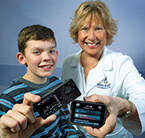Pediatric Endocrinology and Diabetes
The Division of Pediatric Endocrinology and Diabetes offers a wide variety of clinical services, research and training opportunities. In addition to the diagnosis and treatment of endocrinological problems, our faculty members are also involved in a variety of basic science and clinical research.
The division is staffed by a team of physicians and nurses, including certified diabetes educators. The division offers expertise in all areas of pediatric endocrinology, including disorders of growth, puberty, sex differentiation, glucose metabolism, bone and mineral metabolism, the pituitary/hypothalamus, the thyroid, the adrenal and the gonads.
The Johns Hopkins Pediatric Diabetes Center employs a multidisciplinary approach in which a team consisting of physicians, nurse educators, a dietician, a behavioral health specialist and a social worker provides comprehensive care of children and adolescents with diabetes, including cystic fibrosis-related diabetes, and support to their families.
Endocrinology and Diabetes FAQ with Dr. Sheela Magge
Sheela Magge, director of the Division of Pediatric Endocrinology and Diabetes, provides an overview of the division, the care of diabetes patients and their families, research innovations and why she is honored to care for patients at Johns Hopkins Children’s Center.
Pediatric Endocrinology and Diabetes Programs and Centers
- Bone Health Clinic
- Cystic Fibrosis-Related Diabetes
- Johns Hopkins Pediatric Diabetes Center
- Emerge Gender and Sexuality Clinic
- Klinefelter Syndrome Center
Conditions We Treat
The following diseases and conditions are treated by the Division of Pediatric Endocrinology at Johns Hopkins Children's Center:
- Acromegaly
- Adrenal insufficiency/Addison's disease
- Congenital adrenal hyperplasia (CAH)
- Cystic fibrosis-related diabetes
- Delayed puberty
- Diabetes insipidus
- Diabetes mellitus
- Disorders of sexual development
- Growth hormone deficiency
- Hyperprolactinemia
- Hyperthyroidism
- Hypocalcemia
Pediatric Endocrinology and Diabetes Research
Read about the research activities of the program faculty.
- Discovering genetic modifiers of cystic fibrosis-related diabetes and other endocrine complications of CF
- Understanding the cause of osteoporosis/skeletal fragility in childhood and identifying treatment targets
- Delineating the relationship between differential body composition and cardiometabolic risk
- Use of technology to improve care and outcomes in youth with diabetes
- Investigating the role of adipokines and understanding their role in lipid and glucose metabolism
Featured Stories
Interview: David Cooke on Klinefelter’s
Had he been practicing some 40 years ago, pediatric endocrinologist David Cooke’s profile of patients with Kleinfelter syndrome would’ve differed sharply from today’s view.

Personalizing Diabetes Care
People with type 1 diabetes have to learn how to deal with their disease. Those that manage their blood sugar well know the intricate dance of how to deal with a variety of situations: a serving of a coworker’s birthday cake, playing sports, dealing with a bout of stomach flu.

Contact Us
Request an Appointment
General Information
410-955-6463, option 2
After-hours On-call Physician
410-955-6070 (Ask for pediatric endocrinologist on call.)
Locations
Division of Pediatric Endocrinology
David M. Rubenstein Child Health Building
200 N Wolfe St, Room 3120
Baltimore, MD 21287
Johns Hopkins Pediatric Endocrinology Center at GMBC
6701 N. Charles St.
Towson, MD 21204
Endocrine Clinic at Mt. Washington Pediatric Hospital
1708 West Rogers Ave.
Baltimore, MD 21209
Johns Hopkins Community Physicians Annapolis / Edgewater
137 Mitchells Chance Rd, Ste 180
Edgewater, MD 21037
Charter Professional Building located on the Johns Hopkins Howard County Medical Center campus
10700 Charter Drive, Suite 140
Columbia, MD 21044
The Johns Hopkins Health Care & Surgery Center - Bethesda
6420 Rockledge Drive, Suite 2300
Bethesda, MD 20817



